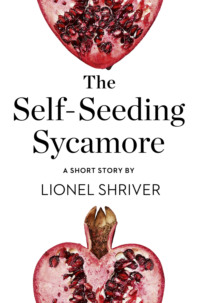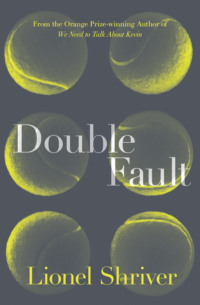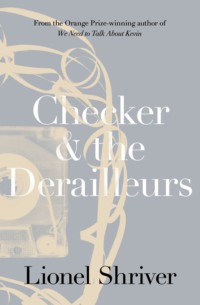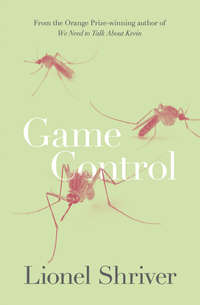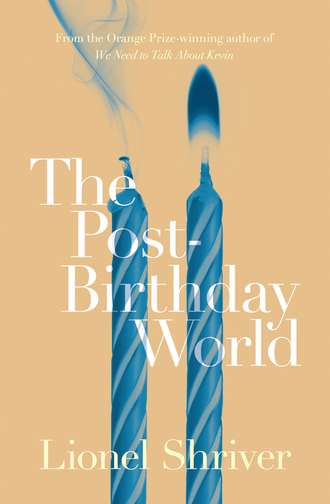
Полная версия
The Post-Birthday World
Irina failed to follow the most primitive plot twists in the movies he rented. The visions that had begun that first phantasmagoric Sunday evening had only multiplied, furnishing far more transfixing drama than anything Lawrence dug up at Blockbuster. And visions they decisively were, as opposed to fantasies. She didn’t seem to concoct them like a fabulist, but to be subjected to them like Alex in A Clockwork Orange, arms bound, eyelids propped. She doubted she could stop them if she tried. But then—she didn’t try.
There is a knock on the door. It is late at night. They have not been expecting a guest. Irina sags. She is heavy with foreknowledge of who has come calling, and of what the visitor will require of her. Limp in her armchair, she is slow to rise. She follows Lawrence to the hall. On the landing stands Ramsey Acton, ramrod-straight and stock-still. He would never have travelled with his most treasured possession outside its case in real life. But in this solemn passion play, he is gripping his cue, planting the butt on the lino like a staff. Clad in black, he looks Old Testament, like one of the prophets. His blue-grey eyes are harrowing. They do not light on Lawrence, but stare directly over his shoulder to Irina. Ramsey’s refusal to acknowledge her partner’s presence does not seem rude. By implication—whatever the reason for Ramsey’s strange appearance at their door in a city where people do not customarily drop in on one another unannounced, much less at such an hour—it has nothing to do with Lawrence. Irina meets Ramsey’s eyes. They are uncompromising. No one says a word. Ramsey doesn’t need to. This is a summons. Should she fail to heed it, he will not be back.
London’s night air is cooling at the close of summer. Irina takes her coat from the rack in the hall. Following Ramsey’s gaze, Lawrence turns to Irina as she draws on her wrap.
He looks mystified. He has not seen Ramsey Acton for over a year. He has no understanding of why the man would show up like this with no warning. Yet it is too late for explanations. She is sorry. In the oddest way, for Irina this has nothing to do with Lawrence, either. She picks up her bag from its hook. That is all she takes. It is all she will ever take. There is every likelihood that she will never return to this lovely flat again. Brushing silently past Lawrence, she slips to Ramsey’s side. His cool, dry hand slides around her waist. Finally Ramsey looks Lawrence in the eye. The one look transmits everything. All these weeks she has been petrified by the prospect of sitting Lawrence down one arbitrary evening and blurting what he most fears to hear. The hackneyed scene will no longer be required. Lawrence knows. He is reeling from learning too much too fast. His dizziness can’t be helped. He will have all the time in the world to regain his bearings—to piece together painfully why she must have snapped at him over so minor a matter as toast.
Ramsey tosses his cue lightly into the air and catches it at a midpoint, where it balances. The cue has transformed from Biblical staff to an implement more playful, like the cane in a tap dance by Fred Astaire. Gracefully, Ramsey turns her from the door. They walk down the stairs.
The other recurrent vision was odder, because it never went anywhere. It just sat.
Ramsey and Lawrence are seated at the dining table in Borough. This is the same table at which they had consolidated the couple’s resolution last year—Lawrence’s resolution, really—that though their established foursome with Jude and her husband was no more, Ramsey would not be jettisoned from their friendship. How poignant: it is only thanks to Lawrence’s insistence that Ramsey has been rescued from social oblivion. Irina would have let the man slip from their acquaintance altogether. As if she knew, and had been leading herself not into temptation by sternly lashing the object of her unconscious desire to a little raft and letting it drift downstream. As if Lawrence had known also, and had run off to scoop Ramsey’s raft from receding waters as a gift for Irina—as if Lawrence were pimping for his own ersatz wife.
Wife. The word forms the centrepiece of the mirage, like a bouquet on the table. Lawrence and Ramsey are sitting opposite, squared off. In the knock-on-the-door fancy, Lawrence seems irrelevant. In this one, it is Irina who doesn’t pertain. She is standing, exiled to the hallway. This is solely a matter between two men. Though the scene’s trappings are civilized—the dining table is a Victorian antique, the hand-sewn drapes are drawn and discreet—the feeling is Wild West, OK Corral. There could as well be a gauntlet on the table, and a pair of pistols.
Lawrence’s expression is tolerant. Whatever this is about, he will hear Ramsey out. Ramsey’s expression is simple, open.
Ramsey says to Lawrence, “I’m in love with your wife.”
This one line, that is the vision. It poses neither question nor solution. It merely frames a predicament. The scene stops there, for there is nowhere for it to go. Were the confrontation to carry on—Lawrence might say gruffly, “Well, that’s tough luck,” and Ramsey might return quietly, “Whose tough luck?”—the perfect impasse would remain. However little Irina herself “pertains,” Irina and only Irina has the power to move this encounter beyond face-off, to advance the plot.
Especially this second scenario was sufficiently trite that it ought to have embarrassed her. But she wasn’t embarrassed. It was too interesting. I’m in love with your wife. Irina wasn’t Lawrence’s wife. Yet the word arose in her mind’s eye because it was true. Whatever the law might dictate, Irina was Lawrence’s wife.

In the days she’d been capable of focusing on more than her own misery, Irina had registered what the dramas and thrillers of the sort that Lawrence fed their voracious VCR were abundantly about. In the main, films place protagonists in a moral quandary, or test their mettle with trials by fire. Yet few members of the audience ever confront the cinematic dilemma in real life. Most people don’t have to figure out how to blow the whistle on government conspiracies without getting themselves killed. Most people aren’t pledged to take an assassin’s bullet to protect the president. World War II is over, and the standard Western mother is not likely to have to choose between the lives of her two children in a concentration camp.
By contrast, there is one province in which, sooner or later, virtually everyone gets dealt a leading role—hero, heroine, or villain. Performance in this arena is as fierce a test of character as being tempted to sell nuclear secrets to Beijing. Unlike the slight implications of quotidian dilemmas that confront the average citizen in other areas of life—whether to report cash income on your taxes—the stakes in this realm could not be higher. For chances are that at some point along the line you will hold in your hands another person’s heart. There is no greater responsibility on the planet. However you contend with this fragile organ, which pounds or seizes in accordance with your caprice, will take your full measure.
Irina had liked to think of herself as a decent person. Yet in this most telling of spheres her behaviour had grown disreputable overnight. While she might have preferred to regard her two-timing as “out of character,” it is never persuasive to argue that you are not the kind of person who does what you are actually doing. Ipso facto, her furtive afternoons with Ramsey Acton were necessarily in character. For that matter, barring the onset of brain-wasting diseases like variant Creutzfeldt-Jakob, there may be no such thing as behaving “out of character.” Should what you get up to fail to comport with who you think you are, something is surely inaccurate (and likely optimistic) about who you think you are. Since Irina had not consumed enough British beef to blame vCJD, she was not therefore “a decent person,” but a duplicitous, traitorous tramp whose attachments were shallow, whose word, implicit or otherwise, meant nothing, and who was hell-bent on defiling the finest elements both of her life and in herself.
Yet every time her eyes found Ramsey’s face—which had a delightful way of changing ages depending on the light; since over the course of five minutes it could flicker from adolescent devil-may-care to middle-aged gravity, then on to the fatalistic resignation of an old-timer, she often felt in the presence, cradle-to-grave, of a whole man—she felt good, and not the indulgent, petty feeling-good of eating chocolate. When he touched her—and he needn’t cup her bare breasts or sidle fingers up under her skirt; holding her hand would do it, or resting his forehead on her temple—she experienced the sense of revelation that physicists must enjoy, when they believe they’ve finally put together that elusive theory of everything, located the one prion or quark that binds all matter. In the moment, it was impossible to conceive of this feeling as wicked. In Ramsey’s arms, her attraction to this remarkable snooker player (of all things) not only seemed “good,” made her “feel good,” but seemed an attraction to The Good—to an absolute that made all life worth living, rejection of which would be both morally reprehensible and inhuman. Only back in the Borough flat, and confronted with a man who had bestowed on her nothing but generosity and did not deserve to be repaid for his devotion with coldness and perfidy, did Irina feel unclean.

On the morning of August 31, Irina trotted once more numbly to the newsagent for a Sunday Telegraph. En route, she upbraided herself for imputing internal turmoil to strangers, for her fellow pedestrians seemed universally to look stricken. She allowed herself a touch of irritation at having to weave past so many laggards, trolling the pavements in a narcotic daze. More bizarrely, at the newsagent customers were murmuring to one another, as if all the rules of city life had been suspended for the day.
Alarming headlines were inconclusive, photos consuming most of the front pages.
Brow furrowed, Irina scurried back to their building, to find the girl from the ground-floor flat sitting on a lower stair with her head in her hands. Irina had never learned her name, but wasn’t so devoted to the chilly etiquette of urban life herself, nor grown so callous in her recent self-absorption, that she would angle her way blithely around a crumpled fellow tenant sobbing her heart out.
Irina put a hand, just, on the girl’s shoulder. “Are you okay? Do you need any help? What’s wrong?”
Again, with London protocol so drastically revised that Westminster could as well have issued a decree, the girl didn’t merely snuffle that she’d be fine, thanks, but began to gush. “My boyfriend doesn’t understand! He’s furious with me! He says I didn’t even cry like this when his mother died. But I just can’t believe it! I’m gutted! It’s so sad!”
Irina shyly unfolded the paper in her hand, which she had halved not so much for ease of carrying as out of respect. “I’m sorry, I just got up, and the papers only …”
Overcome, the girl could now only nod. “B-both. Both of them.”
This turn of the wheel wasn’t quite in the same league as the collapse of the Soviet Union, but in Britain it came close.
“This is absolutely incredible.” Closing the door, she hugged the headline to herself. “Diana!”
“What’s that cow up to now?” said Lawrence. She knew he would light into one of his cruel imitations. “Oh,” he said in falsetto, lowering his head and batting his eyelashes, “I’d love to help the underprivileged, but I just ate five jars of marshmallow fluff, and have to go throw up! While I’m stuffing my whole hand down my throat, could you tell those nice people that was not cellulite in my thighs? I’d just been sitting on a chenille bedspread! Afterwards, can I tell that story about Charles saying, ‘Whatever love is’? Because with so many dresses I only wear once, it’s important to keep the commoners feeling sorry for me!”
“Are you quite finished?”
“Just getting started!”
“Because she’s dead,” Irina announced.
“Get out.”
“She and Dodi Fayed were being chased by photographers and crashed in a tunnel in Paris.” Irina delivered the news with spiteful triumph. Not often did she see Lawrence speechless (all he could manage was, “Wow. That’s weird”), and watching him flounder was satisfying. “So maybe the next time you start to say something vicious about someone you hardly know, you should stop to think that any day you could find out they’re dead, and consider how you’d feel.”
Over the national keening of the next few weeks, Irina took the jarring death of the “people’s princess” personally. In narrative terms, Diana’s story had lurched from genre to genre. Like Irina’s once-charmed romance with Lawrence Trainer, a fairy tale had soured to soap opera, and then hurtled towards tragedy.

“You said you had something you had to talk to me about, and this had better not be just another girly mope about Princess Di.” The merlot banged on the table, next to Irina’s zinfandel. “For a schlep all the way out to the East End, I expect nothing short of scandal.”
For some people keeping secrets was invigorating, but for Irina they were combustible; by September she was about to explode. Absent a therapist, the next best thing was plain-speaking Betsy Philpot. They’d arranged to meet at Best of India, a hole-in-the-wall on Roman Road. Betsy and Leo lived in Ealing, well west, and Betsy had resisted travelling across the whole of London with five Indian restaurants in her own neighbourhood. But Irina insisted that Best of India served distinctive dishes at reasonable prices; it lacked a liquor licence, but didn’t charge a corking fee. An executive with Universal—recently acquired by Seagram’s—Leo had just accepted a salary cut to stay on board. Glad to save a few quid on the wine, Betsy had relented. Besides, like most excellent company, Betsy was a gossip, and would have met Irina in Siberia if she had “something to talk about.”
With the conventional obsequiousness of Indian waiters (a thin cover for contempt), the Asian uncorked the zin, then presented their poppadoms and condiment tray with a flourish. Irina made a mental note to avoid the raw-onion relish.
“Well, out with it,” said Betsy. “Life’s short, and tonight’s shorter.”
Irina hesitated. Obviously, it was dangerous to spill the beans to anyone who was friends with Lawrence as well. But to release the story into the world was also to relinquish sole proprietorship. When you let other people in on your business, you allowed them to have cavalier opinions about it; you might as well hand guests your prized original Monet miniature for a coffee coaster. Too, the moment she opened her mouth, her transgressions would become a matter of public record. Any prospective retreat would leave a slime trail.
“You’re not going to approve,” said Irina.
“I’m your judge and jury?”
“You can be moralistic.” Though Betsy hadn’t been Irina’s editor for years, a shadow of hierarchy remained. Betsy wouldn’t live in any fear of Irina’s opinion of her.
“Excuse me, I didn’t realize this was going to be a critique of my character.”
“It isn’t.” Irina took a slug of wine. “I’m sorry, I shouldn’t start defending myself against all the mean things you’re going to say when you haven’t said them yet.”
“My guess is that you’re the one who’s been saying mean things, about yourself.”
“You’re right there—vile things.” Another slug. “Anyway, back in July, something—happened to me.”
“You know how when you’re in the gym, and you have to do your sit-ups, and you go for water and retie your shoes? Putting it off never makes it any easier.”
Crumbling her poppadom, Irina couldn’t look Betsy in the eye. “I met someone. Or we’d known each other for years, but only met-met this one night.” No matter how she told it, the tale sounded cheap. “I seem to have fallen in love with him.”
“I thought you were in love,” said Betsy sternly. Her own congenial marriage had the dynamic of a corporate partnership, and Betsy had more than once expressed a wistful envy of Irina’s conspicuously warmer tie.
“I did, too,” said Irina dejectedly. “And now, on a dime, I feel nothing for Lawrence, or nothing but pity. I feel like a monster.”
“—Since when do you smoke?” Irina’s British friends would have cadged one, but Betsy was a fellow Yank, and rather than slip out the packet of Gauloises, Irina might as well have tabled a Baggie of white powder, a used syringe, and a spoon.
“It’s only occasional.” Irina tried to direct the smoke away from Betsy’s face, but the circulation system blew it back again. “Don’t tell Lawrence. He’d have a cow.”
“I bet he knows.”
“I do the whole breath-mint thing, but yeah, probably.”
“Oh, he definitely knows about the ciggies. But you have bigger problems to fry. I meant I bet he knows you’re having an affair.”
Irina looked up sharply. “I’m not.”
Betsy examined her sceptically. “This is a platonic infatuation? You go to museums, and work yourself into ecstasies over a painting?”
“I’ve never been sure what ‘platonic’ means exactly. We, ah—it’s physical, all right. But we haven’t, ah, sealed the deal. I thought that was important.” She was not at all sure it was important. Restraint has an eroticism of its own, and the agony of forgoing sexual closure had for weeks achieved a sweetness that bordered on rapture. If this was loyalty, what in God’s name was betrayal?
“Has the nooky side of things been so bad, with Lawrence? Fallen off?”
“Bad? It’s never been bad with Lawrence. We probably, or we used to until recently, have sex three or four times a week. But it’s strangely impersonal.”
“Three or four times a week, and you’re complaining? Leo and I fuck about as often as we rotate our mattress.”
“I never know what’s going on in his head.”
“Why don’t you ask him?”
“I’m too afraid that he’ll ask me what’s going on in mine.”
“Which is?”
The waiter arrived, and Irina coloured. The Asian surely assumed that loose Western floozies routinely conducted just this sort of seedy discussion over poppadoms.
“I think about someone else,” she mumbled once he’d taken their orders. “It started out as a last resort, and now it’s an entrenched bad habit. If I don’t summon a certain other party in my head, I can’t—finish the job.”
“This other party. What does he do for a living?”
“If I tell you, then you’ll know who it is.”
“You’re planning on getting through a lamb korma, a chicken vindaloo, and a side order of spinach and chickpeas without telling me the guy’s name?”
Irina stirred a shard in the coriander chutney. “You’ll think I’m nuts.”
“You’re projecting again. You think you’re nuts.”
“It’s not that crazy. On the face of it, there’s no reason that a children’s book illustrator would have a whole lot in common with a think-tank research fellow, either.”
“What, is this guy some working-class gardener or something?”
“He wishes he were working class. But he has plenty of money.”
“Look, I’m not going to play Twenty Questions here.”
Irina shook her head. “If we ever go public, Jude is sure to think we were running around behind her back while they were still married. We weren’t.”
“Ramsey Acton?” said Betsy with incredulity. “I’ll give you this: he is good-looking.”
“I hadn’t even noticed he was handsome before; or only abstractly.”
“This entire country has noticed your boyfriend’s good-looking, as of the 1970s.”
Their food arrived, and Irina helped herself to a tiny spoonful of each dish, which puddled in disagreeable pools of red oil on her plate.
“You know, you’ve lost weight.” The observation carried a hint of resentment. Betsy, as they say, was big-boned—though she was pretty, and Irina had never figured out how to tell her that. “It’s okay for now—you look hot as the blazes, frankly—but don’t overdo it. Lose any more and you’ll get waiflike.”
“I’m not on a diet. I just can’t eat.”
“You’re on the luv diet. Worth ten pounds. But don’t worry—you’ll put it back on at the closing end.”
“Who says there’s going to be an end?”
“Irina, get real. You’re not going to run off with Ramsey Acton. Jude made that mistake; learn from it. Get him out of your system. For that matter—if you’re telling me the truth—maybe you should get it over with and fuck the bastard. Stop building it up into such a big deal and find out one more time that fucking is fucking. On this score, most men are fungible. Then patch things up with Lawrence. As for whether you tell him about it and have a big cry, or shove it under the carpet like a grown-up, that’s your call. But Ramsey is not a long-term prospect.”
“Why not?”
“For starters? Take what you said, about money. Sure, Ramsey’s made a lot of it. But according to Jude, it’s all very easy-come. There’s a corollary. She couldn’t believe how little there was to filch when they divorced.”
“She got a house in Spain!”
“Out of millions? I don’t know how much you know about snooker, but these boys make do-re-mi hand over fist when they’re on a roll. Why isn’t there more of it left? I’m not only talking about finance, but temperament. You go all the way to Roman Road so you can bring in your own bottle of red. You’re frugal. Ramsey? Is not frugal.”
“It could do me good, to learn to splurge a little. It has done me good.”
“Did you ever talk to Jude about what it was like to live with a snooker player?”
“Some,” said Irina defensively. “She moaned a lot. But she was prone to. As Ramsey says, she’s chronically dissatisfied. They were a bad match.”
“And you’re a good one? Go on the road with them, and you’re stuck in hotel rooms, playing with the tea machine. But they don’t want you to go on the road, not really. They like to play hard away from the table, too. And stay home, you’re a widow for the season, sitting there wondering how much he’s drinking, what’s up his nose, and who’s sidling next to him at the bar.”
“That’s a cliché.”
“They always come from somewhere.”
“Ramsey’s different.”
“Famous last words.”
Irina sulked over her spinach, and threw back another defiant gulp of wine. When the waiter silently opened the second bottle, she sensed his disapproval.
Betsy wasn’t finished. “If you’re seriously contemplating a future with this character, can we talk turkey? Ramsey’s, what, fifty?”
“He’s only forty-seven.”
“Big diff. Forty-seven, in snooker, is like ninety-five for everybody else.”
“Ramsey says that, when he started out, plenty of snooker players were only reaching their prime in their forties.”
“Times have changed. The superstars are all in their twenties. Ramsey’s slipping. You can count on the fact that he’ll keep slipping, too. Maybe it’s eyesight, or steadiness of hand, or just starting to get burnt out despite himself, but he’ll never get back to where he was. He’s never quite won the World Championship, and he hasn’t a snowball’s of winning it now. The point is, you’re getting the guy at the tail-end. It’s not the fun part. Sometime soon he’ll be forced to retire, unless he’s willing to publicly embarrass himself. Snooker’s his whole life, as far as I can tell. Retirement’s not going to be pretty. When I picture it, cognac and long afternoon naps feature prominently.”


